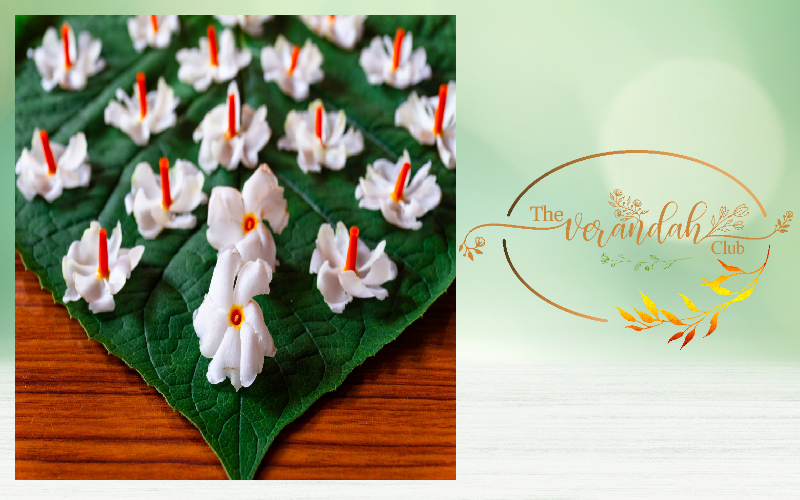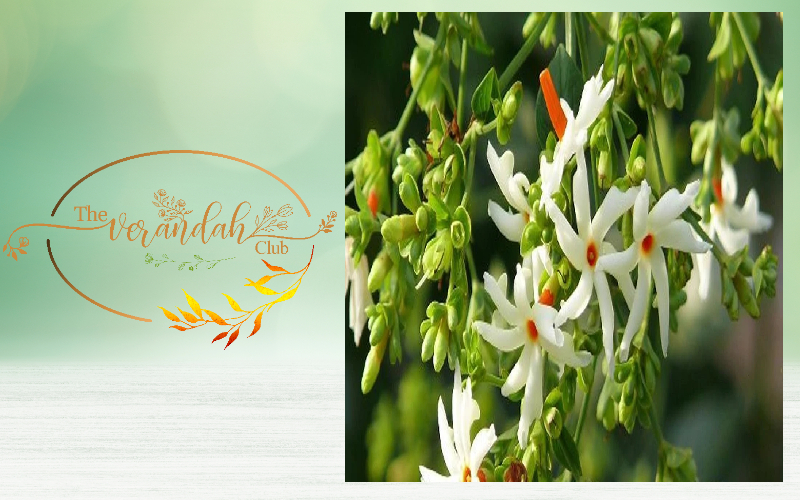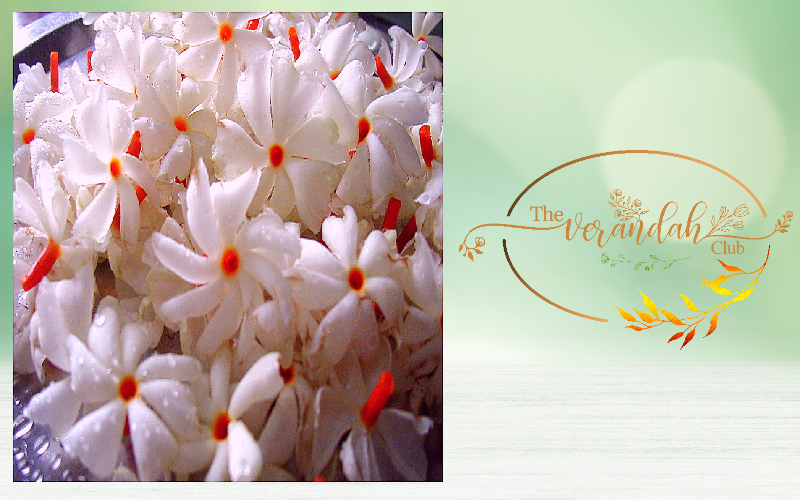
I was on a stroll in a nursery garden where I espied two different plants with the name stuck on them as Parijatha and Pavizhamalli respectively. I wondered, if my memory was right that Parijatha was a celestial plant belonging to the devas. I had heard interesting stories about Krishna caught in a tight corner by the pranks of Naradha. The latter who descended from heaven with a bunch of Parijatha flowers with excellent fragrance handed it over to Krishna. Unaware of the plight awaiting him, Krishna adorned Rukmini’s plait with Parijatha. Drawn by the alluring fragrance Sathyabama, always proud of her long plaits was ready with her demand for the precious tree. The story goes on when a quarrel ensues between Krishna and Indra who owned the plant in his Nandhavanam. Unable to gainsay Krishna, Indra vents his anger on the Parijatha plant. He curses the plant to be fruitless and all the flowers borne by her would be shed away from her.
Having both the plants in close quarter, I was curious to know which one was the real Parijatha. Both looked attractive, both spread wonderful fragrance, both were thick shrubs, and aimed to grow taller. But where did the disparity lay? Eyeing by chance the flowers I saw the one titled, Parijatha had layered petals all white in colour. The other one named, Pavizhamalli appeared to be comparatively restrained. My doubt about its nativity was solved when I saw flowers with a few white petals about six to eight, arranged in a circular form on red stem and it matched with the story of flowers falling away from the plant.
My day dreaming got paused by the gardener who narrated at length the divine nature of the plants. He would not have known that I was there not to buy, but to make sure if Parijatha and Pavizhamalli were one and the same. But he continued and proceeded to Pavizhamalli. He called it too a divine plant capable of growing stout and tall. Now an alarm struck in my head to listen to him keenly. He said its leaves were coarse, it never yielded fruits and finally the beautiful flowers lived a short life and its flowers would be strewn away. The confusion so long prevailing in my mind was well cleared.

In galloping speed, the entire story of Pavizhamalli alias Parijatham was before my mind’s eye. It was a wish-fulfilling tree ever ready to fulfil the desires of whoever solicited her. It was brought to earth by Krishna. Would that be possible?! When Ganga could descend to earth why not Parijatha. To this day in Uttar Karnataka and surrounding belt street-plays on Shri Krishna Parijatha are performed with great sincerity and Bhakti (devotion) for five days.
More significant are the words of the great Aacharya, Sri Vedanta Desika who describes in his masterpiece, ‘Raguveeragadyam’, how Sri Rama when he visited various muni and Rishis’ Aashram fulfilled their needs and bestowed salvation. To quote his words:
“Dandaka-Tapovana-Jangama-Paarijata”
Meaning: Oh Rama! You are a moving Parijatha tree in the penance groves of the Dandaka forest. Comparing the greatness of Rama to the Parijatha tree speaks volumes of its goodness in granting the wishes of whoever approaches her.
She is more than other divine heavenly beings as Kamadhenu, Iravatha, Uchishta Raavas, Kalpatharu and many others. In fact, a temple with Parijatha tree about 3500 years old is located in Barabanki in Uttar Pradesh, where even today people throng mainly to worship the age old tree and pray for the fulfilment of their desires.
Yet another story goes that the Parijatha tree was planted in Kintur by the Pandavas which helps Sri Krishna to enable Kunthi Matha worship Siva with Parijatha flowers. From then on Lord Siva came to be known as Kuntheshwar. The existence of the tree with no fruits and seeds is the only one of its kind by longevity, size, and value. This is the only tree that is available all over the world.
Hence, much care and attention are given for the maintenance of the tree by the Indian government. Its worth from the viewpoint of Ayurveda is immense. With the narration of a mysterious story of a princess named Parijath who sacrificed her life due to her frustration that her love for Surya, the sun god was not recognized, we learn how the tree got its name. The tree that grew there was named Parijatha.

It is believed that yearning for his love and being disappointed she blossoms in the night spreading pleasing fragrance and the flowers shed with petals downwards before sunrise. That much for both the lighter and serious aspects of the story form.
To speak of the virtues of Parijatha tree - it is literally endless. To comprise all its value, it would suffice to say it is a ‘bandar’, meaning a treasure chest for the cure of all types of diseases. It is not only the treasure that enables the cure for all kinds of diseases but is also easily reachable at almost no cost. The flowers and leaves are ambrosia for good health and longevity of life. Its usage is spread far and wide. The Assamese believe in its myriad health benefits and hence use it in recipes, in spite of the bitterness of leaves. In Bengal, it is added to fish dishes and handled with utmost care being considered a delicacy.
The merit of the tree Parijath is well explained in a small book titled ‘Prapanna Parijata’ by the great Aacharya, Vatsya Varada Guru also known as Nadadoor Ammal, the preceptor of Vedanta Desika. In a nutshell, whoever is nurtured by the Parijatha tree would enjoy not only good health but a glow and sheen more extraordinary, as though reflecting the gorgeous shining of gems of varied nature, which Parijatha brought along with her when she emerged out of the ocean when it was churned by Devas and Asuras to get Amrit. Parijatha remains the only flower most preferred by Siva as well as Vishnu. They are described as dazzling as Parijatha. Mention should be made of great Krithi-s and even 'Bhagavad Gita' where in Parijatha is mentioned because of its divine quality.
After a long session of comparative study of the two shrubs that I saw initially, I came to the conclusion that Pavizhamalli is the celestial Parijatha out of the heaven kind enough to bless them with good health that would bring them joy and happiness.
NEXT ARTICLE